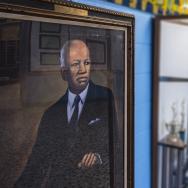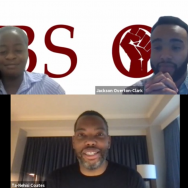Darting across America’s racial landscape, writer and scholar Jelani Cobb unspooled lessons from the past to put the “troubling” present into perspective—focusing in particular on the history and future of voting rights.
A columnist at The New Yorker and the Ira A. Lipman Professor of Journalism at Columbia University, Cobb delivered his remarks as part as the University of Chicago Harris School of Public Policy's continued celebration of Black History Month.
The Feb. 9 event—the second in the Harris Black History Month series—included a discussion with moderator Alaina Beverly, the assistant vice president for urban affairs at the UChicago Office of Civic Engagement. Beverly also led a question-and-answer session between Cobb and the virtual audience.
Each Harris Black History Month event, all of which explore the power of social movements, “seeks to facilitate meaningful conversations about the Black experience in the United States and around the globe,” said Michelle Hoereth, assistant dean for diversity and inclusion, as she introduced Cobb.
“Tonight's conversation,” she added, “will be a bit of a history lesson and an effort to provide greater context for understanding not only where we are at this moment in time, but how we got here and, more importantly, how do we move forward?”
To provide that context, Cobb talked about “what history says and how it enlightens us about the current circumstances.”
Those circumstances are troubling, he said. “We should be very clear about that.”
“Just this week,” Cobb said, “we have seen the Supreme Court allow Alabama laws … that disadvantage Black voters to remain intact. We have re-embarked on a McCarthyite era of book banning. We have seen a reflexive and limbic attack upon a false doctrine of critical race theory, or something being referred to as critical race theory, that has impacted the ways in which history can be taught.”
“So tonight,” he said, “I want to talk a little bit about the ways in which these dynamics and these developments echo previous moments and what they have to teach us.”
To make one of his points about the echoes of previous moments, Cobb revisited January 2021 and “two astounding developments.” One was Georgia electing the state’s first Black and first Jewish senators, the Rev. Raphael Warnock and Jon Ossoff, both Democrats. The second was the attack on the U.S. Capitol by supporters of Donald Trump, who sought to “hold onto the office of the presidency, even if it meant the demise of American democracy.”
Watching Georgia election returns, particularly from Black-majority Fulton County, Cobb said he was reminded about how Black men gained the right to vote with ratification of the 15th amendment to the United States Constitution in 1870.
After the Civil War, he said, there needed to be a bulwark against Southern political power. “And the reasoning, correctly as it turned out, was that if Black people were given the right to vote, they would vote overwhelmingly for the party of Abraham Lincoln, the Republican Party,” he said.
Voting rights were given to Black men—but not to women, regardless of color or creed—as part of a political calculation, he said. With more women than men in the South after the war, Cobb added, the fear was that if women were enfranchised, white Southern women would vote just as their deceased husbands and brothers would have and the South would be more powerful in 1870 than it had been in 1860.
“We can distill all this history down to the simple statement that in 1870, Black people were given the right to vote in order to offset the power of a white supremacist movement that threatened to destroy American democracy.”
If Georgia, 151 years later, did not go blue, “then the revanchist forces of white supremacy as embodied by the Trump administration would have continued to steamroll across the country.”
“Once again, Black voters were being placed as the firewall between white supremacy and American democracy.”
Such echoes from the past are at the root of Black History Month.
When UChicago alum Carter G. Woodson, AB 1908, AM 1908, created "Negro History Week" in 1926—which eventually led to Black History Month—“he was really diligently trying to make this point that in this grand tide of history, Black people had a contributing role,” Cobb said.
Woodson “was strikingly prescient about the necessity and the vital urgency of studying the history of Black people in this country, not simply as an exercise in self-esteem boosting or the accruing of random knowledge, but as a vital undertaking for the preservation and protection of democracy itself,” Cobb added.
That preservation is at risk in today’s era of what Cobb calls “a la carte reality—where you can just simply accept the parts of the real world that you like and reject the parts that you don't.”
At Harris, Beverly noted, students learn to use data to help transform society. Is there a role, she asked, that data can play in deconstructing “some of the systems of inequity that we're experiencing?”
In this “post-truth era,” Cobb said, “it is important that we have a bedrock of empirical fact and empirical knowledge and data that’s been gathered about the nature of our social problems.”
It’s also important, he added, to maintain a sense of “realistic optimism”—“not the kind of cheap optimism that we tend to peddle in American society, where we look in the face of tragedy and respond with the anodyne words, 'It will be OK.’ I mean, the kind of optimism that is realistic, that understands that things are not necessarily OK. And that they may turn out to be even worse. But the optimism lies in the sense of survival and the ability to transcend the moment.”
“I’m an optimist,” said Cobb, “but I have the optimism of a boxer in the late rounds. You’ve absorbed a lot of pain and a lot of difficulty, but if you’re still on your feet, there’s still a chance that you can win.”
—Adapted from a story first published by the Harris School of Public Policy. The Harris Black History Month event series will conclude Feb. 23 with a lecture by the Rev. Dr. Otis Moss III, to be held at the Keller Center and streamed virtually.

